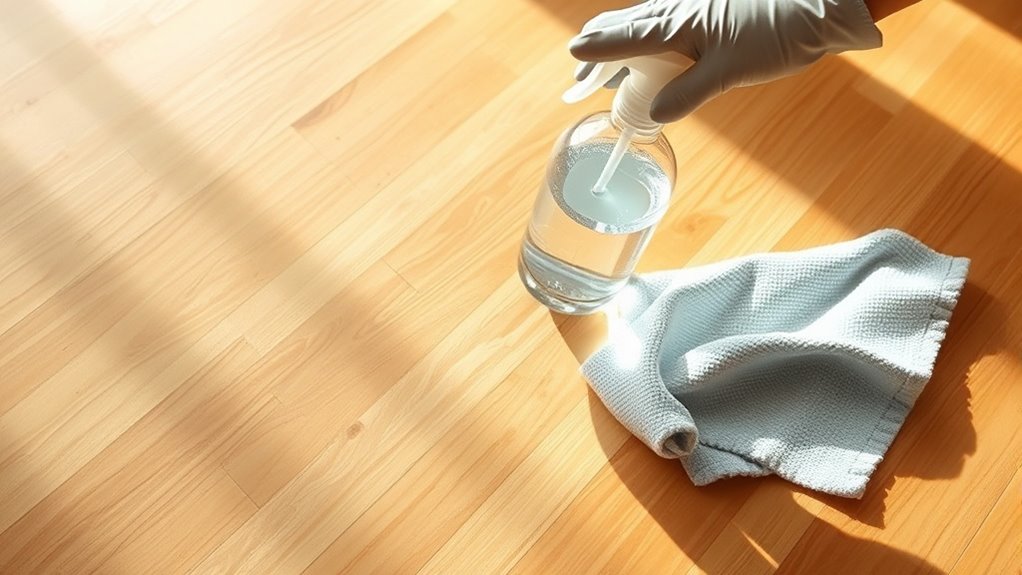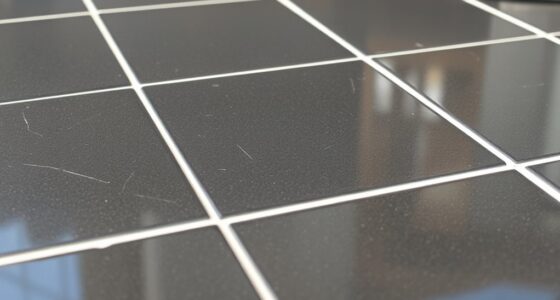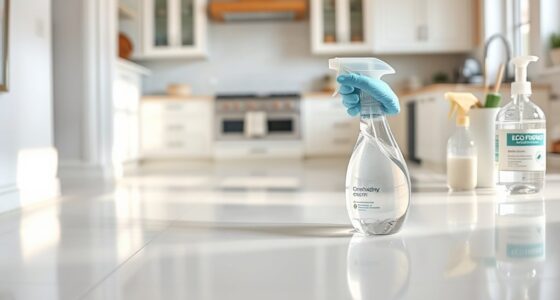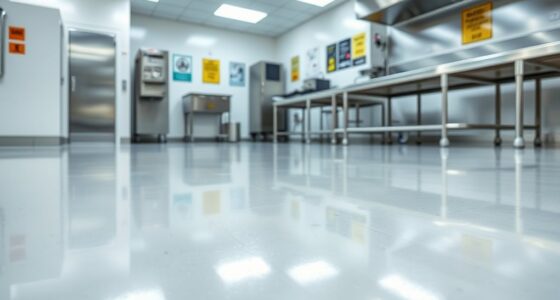To disinfect bamboo floors safely, opt for eco-friendly, plant-based disinfectants or a diluted mixture of vinegar, ensuring you test small areas first. Avoid harsh chemicals like bleach and ammonia, which can cause discoloration or warping. Use a damp mop and avoid over-wetting, and always dry the surface thoroughly afterward. Proper techniques help preserve your floors’ natural finish and longevity. To learn more tips for safe disinfecting, keep exploring effective cleaning strategies for bamboo floors.
Key Takeaways
- Use eco-friendly, plant-based disinfectants or diluted vinegar, avoiding harsh chemicals like bleach and ammonia.
- Always test disinfectants on small, inconspicuous areas before full application to prevent discoloration or damage.
- Spray disinfectants lightly and wipe gently with a soft microfiber cloth or mop to avoid saturating the bamboo floors.
- Avoid using excessive moisture, abrasive tools, or soaking the floor, which can cause warping or surface scratches.
- Dry the floor thoroughly after cleaning to remove residual moisture and preserve the natural finish.
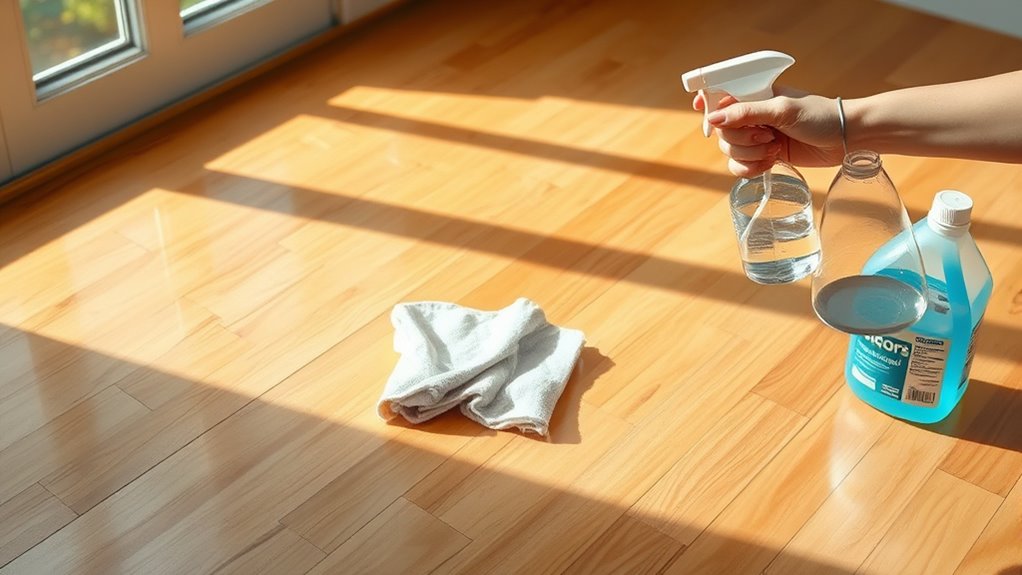
Are you wondering how to keep your bamboo floors clean and germ-free? Maintaining a spotless and healthy surface doesn’t have to be complicated, but it does require choosing the right cleaning methods. Eco friendly cleaning is a smart choice because it’s safer for your family, pets, and the environment. Using non-toxic, biodegradable cleaners helps preserve the natural finish of your bamboo floors while effectively removing dirt and germs. However, it’s important to be mindful of common disinfectant mistakes that can damage your flooring. Many people reach for harsh chemicals without understanding their impact, which can cause discoloration, warping, or loss of the bamboo’s natural sheen.
Choose eco-friendly cleaning methods to protect your bamboo floors and the environment.
When disinfecting your bamboo floors, steer clear of bleach and ammonia-based products unless specifically recommended by the manufacturer. These substances can be too abrasive, stripping away the protective top layer and leaving your floors vulnerable to scratches and stains. Instead, opt for eco friendly cleaning solutions that are gentle yet effective. A simple mixture of water and a few drops of a mild, plant-based disinfectant or vinegar can do the trick. Remember, vinegar should be diluted properly because concentrated vinegar can sometimes dull the finish or create a hazy film if used excessively. Always test a small, inconspicuous area first to make sure the solution doesn’t affect the bamboo’s appearance.
Another common disinfectant mistake is overusing liquid cleaners or saturating the floor with water. Bamboo is a natural material that can absorb excess moisture, leading to swelling or warping. To avoid this, use a damp mop rather than a soaking wet one. Wring out your mop thoroughly before cleaning, and follow up with a dry cloth to remove any residual moisture. Regular sweeping or vacuuming is also crucial to prevent debris from scratching the surface, especially since dirt particles can act like sandpaper over time. Incorporating an air purifier with HEPA filters can further improve indoor air quality and reduce airborne allergens that settle on your floors, prolonging their pristine condition.
Additionally, avoid using harsh scrubbing pads or abrasive brushes on your bamboo floors. These can scratch the surface and dull the finish. Instead, use soft microfiber cloths or mops designed for delicate surfaces. For disinfecting, a light spray of your eco friendly solution followed by gentle wiping is enough to eliminate germs without risking damage. With proper cleaning techniques and avoiding common mistakes, you can keep your bamboo floors beautifully clean, germ-free, and long-lasting.
Frequently Asked Questions
Can I Use Vinegar to Disinfect Bamboo Floors Safely?
You can’t safely disinfect bamboo floors with vinegar because of its risks, like damaging the finish or causing discoloration. Vinegar isn’t recommended for bamboo, so consider natural alternatives like a mild soap solution or specialized bamboo floor cleaners. These options effectively disinfect without harming the surface. Always test a small area first, and check manufacturer guidelines to verify your cleaning method is safe for your bamboo floors.
How Often Should I Disinfect Bamboo Floors?
You should disinfect bamboo floors weekly to maintain cleanliness, guarantee hygiene, and preserve their beauty. Establish a consistent cleaning schedule by mopping regularly, spot cleaning as needed, and deep cleaning once a month. This routine helps prevent dirt buildup, reduces bacteria, and keeps your floors looking their best. Stick to this schedule, and you’ll enjoy fresh, spotless bamboo floors that stay durable and attractive over time.
Are There Eco-Friendly Disinfectants Suitable for Bamboo?
Yes, you can use eco-friendly disinfectants on bamboo floors. Look for biodegradable solutions and plant-based disinfectants that are gentle yet effective. These options help disinfect without harming the environment or damaging your bamboo surface. Always check labels to guarantee they’re free from harmful chemicals and safe for indoor use. By choosing these eco-friendly solutions, you protect your floors and contribute to a healthier planet.
What Should I Avoid to Prevent Damage During Disinfection?
Did you know that using harsh cleaners can damage bamboo flooring, reducing its lifespan by up to 50%? To prevent damage, avoid abrasive cleaners and bleach-based products. These substances can strip the finish and weaken the material. Instead, opt for gentle, bamboo-safe disinfectants. Always test a small area first, and never soak the floor with excessive water, as moisture can cause warping or swelling.
Can Disinfectants Cause Discoloration or Warping on Bamboo?
Disinfectants can cause discoloration risks and warping concerns on bamboo floors if you use harsh chemicals or overly wet solutions. These products may break down the bamboo’s finish or absorb moisture, leading to uneven color or warping over time. To avoid this, opt for gentle, bamboo-safe disinfectants and apply them with a damp cloth rather than soaking the floor. Regularly check for signs of damage to maintain your bamboo’s appearance and integrity.
Conclusion
To keep your bamboo floors safe and spotless, choose gentle disinfectants like diluted vinegar or specialized bamboo cleaners, avoiding harsh chemicals. For example, imagine a homeowner who used bleach and ended up damaging their bamboo flooring’s finish. By sticking to recommended products, you safeguard your floors and make sure they stay beautiful for years. Remember, a little care goes a long way—disinfect wisely to maintain your bamboo’s natural charm and durability.
